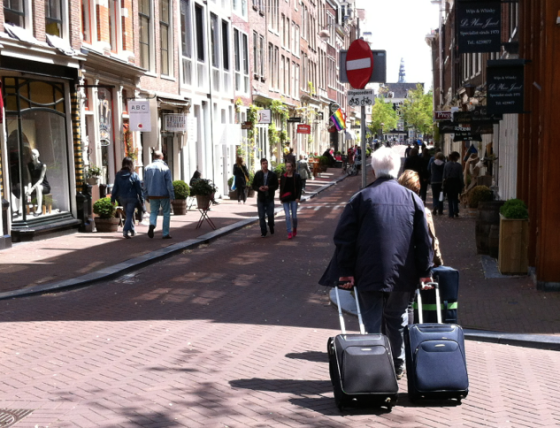Airbnb faces 30,000 claims from Dutch residents on consumer service charges


When Marjolein van der Harst takes a break from managing renovations for an all-female painters company, she likes to visit Ibiza, Budapest, Portugal, and the Netherlands via apartments listed on Airbnb.
‘I love to holiday with Airbnb because I don’t like big hotels and normally it is a little bit more private,’ she said. ‘I enjoyed my holidays…but if I paid too much for them, I would like to get my money back.’
Van der Harst is one of an estimated 30,000 Dutch residents who have joined three sets of claims against the holiday rentals giant, after a Dutch court ruled in March that it was breaking Dutch law by charging a fee to both apartment owners and holiday makers.
For her, it’s a matter of around €200 which she paid in service charges to Airbnb in order to rent apartments in the last three years, and she has registered her claim through the online legal claims start-up Appeal.
‘If Airbnb is working in Holland and we have certain laws, then it has to work by them,’ she says. ‘If I go on vacation to another country, I have to live by their laws and if I don’t, there’s a punishment for that. I can’t say: “I’m Dutch: we have different laws!”’
‘Unjust’
Her claim is being submitted by Appeal, an online-based system to help renters get back fees allegedly charged illegally for a housing transaction, and it is one of Appeal’s 12,453 claims worth a total of €1.9m against Airbnb…and counting.
Frank Oostrum, lawyer and co-founder of the start-up, said it was launched in 2019 originally to serve normal renters who cannot be charged fees for moving into a house since a 2015 supreme court ruling. ‘After the Airbnb case in March, we received a lot of questions from our clients. We already knew a lot about unjust agency fees and rental fees, so we thought we would accept Airbnb claims as well – and it went totally viral.’
The challenges all began in March this year, thanks to Twee Heren B.V, which was started to challenge renters’ fees from Airbnb. In the March ruling in Amsterdam, it was revealed that Airbnb was asking apartment owners to pay 3.6% of the booking value, while also charging an average of 15% of the total to renters.
Although Airbnb argued that it is legislated under Irish law, the Dutch court found that local consumer law still applies, the website was ‘serving two masters’ and had to pay back claimant Jacques Huppes €470.
Intermediary
Thomas Wildenbeest, contract lawyer at FlexIEbel and representing Twee Heren told DutchNews.nl that this was a test case and a group claim for around 10,000 more claimants is being prepared with a value of around €2m. ‘If you act as an intermediary between two parties, and one of them is a consumer, you are not allowed to ask for any money from the renter,’ he said.
‘This is a rule in Dutch law and it applies to estate agents but it also applies to big technology companies such as Airbnb that operate on the Dutch market. It is quite simply contrary to the law and relatively simple to resolve by only charging money to the people letting out property.’
He said that while the March case does not set legal precedent, the other cases are so similar in substance, he believes Dutch judges would logically rule the same way. He added that consumer law in other countries – such as China – could have similar prohibitions, but that this would have to be tested there.
‘Aside from this, it’s a nice platform and what they are doing is great,’ he added. ‘But if someone gets too big, at some point it seems as though they think that local legislation is no longer necessary.’
Huppes confirmed to DutchNews.nl that Airbnb has repaid his fees, and that Twee Heren has begun work on 165 new court cases.
No cure, no fee
Claims – which are typically being managed on a ‘no cure, no fee’ basis and would take some 25% to 30% in fees if the claim is won – are also being launched by other lawyers.
Tenancy lawyer Martijn van Hurne of Onyx Advocaten is representing three claimants who may choose to join a larger claim to go to court if Airbnb and others do not refund service fees. He has told the NRC that other holiday home companies such as Belvilla, HomeAway and (until recently) Natuurhuisje.nl have been charging similar fees. ‘It’s a question of principle,’ he told DutchNews.nl. ‘Airbnb has done something that’s not allowed and filled its own pockets.’
Other cases are being amassed by consumer rights organisation the Consumentenbond, which has told the NOS it is processing 9,700 claims worth an average of €185 per person.
Airbnb told DutchNews.nl in a statement that it would vigorously contest the new claims: ‘The decision of the Amsterdam district court does not set a precedent and courts in Utrecht and Rotterdam have dismissed similar claims,’ it said.
‘In addition, this decision is contrary to the decision of the highest European judge who recently decided that Airbnb is not a real estate agent but an information service. We follow the rules and place the utmost importance on the rights of our users.’
Some Dutch consumers wonder if another option might be booking their holidays through other means in future. ‘If Airbnb isn’t loving the law or doesn’t want to be ruled by it,’ says Van der Harst, ‘maybe they can’t work here in Holland any more.’
Thank you for donating to DutchNews.nl.
We could not provide the Dutch News service, and keep it free of charge, without the generous support of our readers. Your donations allow us to report on issues you tell us matter, and provide you with a summary of the most important Dutch news each day.
Make a donation